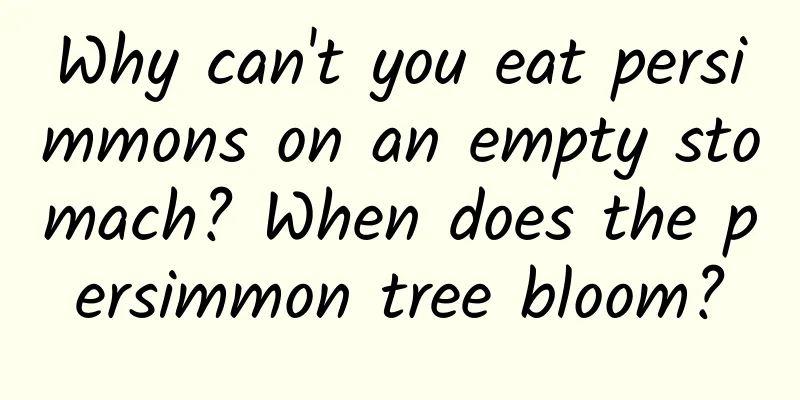Why can't you eat persimmons on an empty stomach? When does the persimmon tree bloom?

|
Persimmon is a short-lived seasonal food. Since it is not available all year round, many people do not know much about it. Today, let's learn some common knowledge about persimmons. First, why can't you eat persimmons on an empty stomach? Second, when does the persimmon tree bloom? Finally, the growth process of persimmons. I hope it will be helpful to you. Contents of this article 1. Why can’t you eat persimmons on an empty stomach? 2. When does the persimmon tree bloom? 3. The growth process of persimmon 1Why can't you eat persimmons on an empty stomach?Because persimmons contain more persimmon gum powder, pectin, tannic acid and tannin, they have a strong astringent effect. When the stomach is empty, the concentration of gastric acid in the stomach is high. After eating persimmons, it is easy to combine with gastric acid to form a hard lump that is difficult to dissolve. After eating more food, the lump gradually grows like a snowball, forming gastric persimmon stones. If gastric persimmon stones cannot be discharged from the body in time, it is easy to cause digestive tract obstruction, or continue to rub the gastric mucosa, leading to severe symptoms such as abdominal pain, vomiting, gastric perforation, gastric bleeding, and gastric erosion. 2When does the persimmon tree bloom?Persimmon trees bloom from May to June. Persimmon is a large deciduous tree of the genus Diospyros in the family Ebisu. It is usually more than 10 to 14 meters tall, with a diameter of 65 cm at breast height; the bark is dark gray to gray-black, or yellow-gray-brown to brown; the crown is spherical or oblong. The branches are spreading, green to brown, glabrous, with scattered longitudinally fissured oblong or narrow oblong lenticels; the young branches are ridged at first, with brown soft hairs or velvet or glabrous. The leaves are papery, ovate-elliptical to obovate or nearly round; the petiole is 8 to 20 mm long. The flowers are dioecious, the inflorescence is axillary, and is a cyme; the pedicel is about 3 mm long. The fruit shape is spherical, oblate, etc.; the seeds are brown, elliptical, and laterally flattened; the fruit stalk is thick and 6 to 12 mm long. The flowering period is from May to June, and the fruiting period is from September to October. 3The growth process of persimmonThe growth process of persimmon is as follows: 1. The growth process of persimmon is different from that of other fruits, and its growth can be divided into two stages. 2. One is the early persimmon, which has a slightly astringent taste. After being artificially de-astringent, it can be eaten, so people call it "filtered juice". 3. The second is a ripe persimmon, with an orange-yellow skin and juicy, sweet flesh. 4. Generally speaking, persimmons will have an astringent taste when eaten right after they are ripe. It is recommended to seal them in a container for a period of time so that the astringency will disappear. |
>>: Can the bladder really explode?
Recommend
Causes of blood clots in the uterus during pregnancy
Some women may have blood clots in the uterine ca...
Postpartum weaning breast enhancement method
Many women choose breast augmentation after givin...
What to do if stretch marks itch
Almost every pregnant mother will develop stretch...
Is it necessary for pregnant women to have their glucose tolerance checked?
Pregnant women always need to undergo many prenat...
What causes follicular atrophy? These are the culprits
For some women, their follicles will shrink inste...
From plate to mouth: Uncovering the profound impact of diet on the oral microbiome
Imagine that every time we chew food, we are also...
Grow taller after pelvic anterior tilt correction
Our pursuit of a happy body never stops. Many peo...
Is it painful to check if the fallopian tubes are unobstructed?
You should know that children are the bond of eve...
What is the cause of bleeding during intercourse a few days before menstruation?
I don’t know if women have had this experience: b...
Frozen embryo transfer for ectopic pregnancy
Pregnancy is a major event that adds joy to a fam...
Can high stress also damage the kidneys? How important is emotional management to kidney health!
In the fast-paced life of modern society, stress ...
What causes acne on the labia minora?
With the diversification of life and dietary reas...
What brand of cooking wine is good? How to distinguish good and bad cooking wine?
Cooking wine is very common in our daily life. It...
Do French fries have to be soaked in salt water? Why do French fries need to be soaked in salt water?
We all know that French fries are a common snack....
Can I hold my baby after medical abortion?
Compared with uterine abortion, many women who ar...









